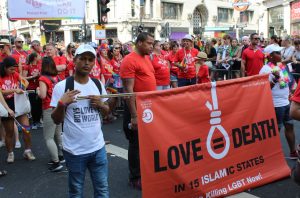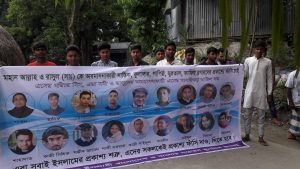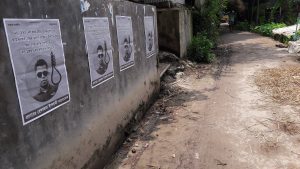By Kishor K. Das
Introduction:
Compromise between Present governments with Hefazat-e-Islam Islam, the biggest Islamic group backed by radical Muslims of the country has reached into an ominous stage according to the non-communal people of Bangladesh. It is thought by the secular people of Bangladesh that the present government is intentionally patronising Islamic groups to ensure their continuing dominance in the political field and to survive in the power. Present ruling party, Bangladesh Awamileague formed a government in 2014 in a non-participated election by all political parties of Bangladesh where 154 parliament member were elected uncontested. Since then the present government has been continuously controlling the opposition parties by extrajudicial activities and has been succeeded to do so apart from those radical Islamic religious groups like Hefazat-e-Islam-e-Islam who are currently acting as policymaker of Bangladesh even not being part of the government. To understand their influence in Bangladesh and realise the power of Hefazat-e-Islam this article intends to go through the evolvement, recent activities, influence and impact of Hefazat-e-Islam in the secularism in Bangladesh.
Background and powerhouse of Hefazat-e-Islam:
Hefazat-e-Islam was formed in 2010, comprising of the teachers of several Madrasas (Islamic Schools) of Chittagong, opposing the proposed plan of giving men and women equal rights in inheritance. They conduct their activities based on Qawmi Madrasas of Bangladesh. According to a report of BANBEIS (Bangladesh Bureau of Educational Information and statistics there are 13902 Qawmi Madrasas where more than 1.4 million Quranic students are studying there in Bangladesh. Teaching Islam through Arabic medium is the sole goal of most of these madrasas. Most of the students there are orphans. In Bangladesh, the term orphan not only refers them whose parents died but also referred to them whose parents do not have the capability to feed them.
The Madrasa authorities house those orphans, feed them and most importantly teach them even to sacrifice their lives to establish an ‘Islamic Society’ for the sake of here and hereafter. Being deprived of the minimum opportunities of the life, those young orphans think people who are giving them shelter and food are ‘angel’ ready to carry any order made by them.
Those orphans from the very early life are thought there is only one God who is Allah and the Islam is superior than any other religion, anyone apart from Muslim are deprived of ‘God’s blessing’, worshiping the sculpture is ‘Haram’ and should not be allowed anybody to do so, women shouldn’t be allowed alone outside and they should stay within veil, every Muslim of the world is their brother and they have to be accountable in the final judgement for what they have done for the fellow Muslims in the world. Apparently, they have also thought the West is the enemy of Islam and they even should sacrifice their lives to kill their enemy to ensure Zannat (heaven), a place of endless luxury with 70 Huris (beautiful women) for each man. By getting brain drained and in expectation of getting Jannat (heaven) most of those students there get ready to do anything for the sake of Islam and quite a significant number of them get ready to engage themselves in Zihad to kill the enemies of Islam.
These Quami Madrasas run by Hefazat-e-Islam-e-Islam are not at all financial dependant on Bangladeshi Government. These 13902 Madrasas comprising of 1.4 million students with food and accommodation totally depend on private donation which enables them to avoid state control. It is alleged that this huge amount of donation comes from some individuals from the Middle East who plan to make Bangladesh as a Sharia government state. Hefazat-e-Islam-e-Islam is the sole authority to run all these Madrasas and Hathazari Madrasa a resident of more than 14000 students is used as the headquarter of them. Shah Ahmed Shah Ahmed Shafi, who opined once “women are nothing but mouth-watering tamarind for men” is the supreme leader of the Islamic group.
Early Roar:
By getting backed by thousands of fearless radical young Muslims, who are ready to die for the ‘sake’ of Islam, Hefazat-e-Islam decided to inform their existence in 2010 for the first time. They declared to hold a rally and meeting in Laldighi, a significant political place of Chittagong City against the then government plan of banning Madrassa education, religious-based politics, and cancellation of the fifth amendment of the constitution and a proposed education policy that would have ended Madrasha education.
*Present ruling party Awami league was the then government took a strong stand against the Hefazat-e-Islam-e-Islam’s procession and did not give them permission to hold the rally. Despite not getting permission from thousands of desperate Hefazat-e-Islam activists, almost all of them were madrasa students, started to head towards Chittagong city with different regional weapons. A clash broke down with Police in the entrance of Chittagong city and many were injured including police. Realising the government’s zero tolerance against them Hefazat-e-Islam confined themselves in the bottle. Since then until 2013 nothing was heard about that radical group.
Resurgence:
Hefazat-e-Islam became talk of the house and real threat of the secularism of Bangladesh in time of the movement of the young generation demanding capital punishment of the crime against the humanity by the Bangladeshi during the liberation war, 1971. Hefazat-e-Islam declared those young bloods demanding the capital punishment of the war criminal as atheist and insisted to protest them. It is worth mentioning that most of the suspect war criminals were a member of another similar radical Islamic religious group Jamat E Islam. Secular blogger and online activists became the target of Hefazat-e-Islam-e-Islam and a few were killed though they never admit their involvement in any killing. However the non-communal community of Bangladesh started to be concerned of Hefazat-e-Islam-e-Islam since then.
13-point Demand Agitation & Muscle Display:
On 06 April 2013, hundreds of thousands people wearing ‘Islamic Dress’ gathered in a rally lead by Shah Ahmed Shafi the head of Hefazat-e-Islam to present their demand. This was the first national scale movement by the radical group. They declared 13 points charter heading with changing the constitution of Bangladesh by restoring the phrase ‘Complete faith and trust in the name of almighty Allah’. Secularism was one of four principles adopted in the constitution of Bangladesh after the liberation war in 1972. Though Bangladesh is a pre-dominated Muslim country ‘secularism’ was rather than ‘Islamic Republic’ was adopted in the mother constitution to honour all the martyrs’ regardless religion during the liberation war.
Other notable part of the whole 12 points charter is introducing new law with capital punishment for any defamation of Islam, stopping male and female free movement, making Islamic education mandatory from primary to higher level of education, removing all the sculptures and cancelling the women policy which intends to empower the women of Bangladesh.
It was declared by the Islamic radical group Hefazat-e-Islam-e-Islam in that rally that there is no way other than accepting their demands by the government. Shah Ahmed Shafi the supreme leader of the group worded outrageously “Regardless whoever in the state power or wish to form government in future, they must accept our 13 points charter.” He also urged to his follower to get ready even to sacrifice their lives for their future programs.
His Fanatic orphan (most of them were teen-age) followers took his evocation as sacred order and did not take long to respond their ‘sacred leader’. After series of separate attacks to the non-communal groups, hundreds of thousands young Islamic dressed Muslims flocked together in the centre of Dhaka, the capital city of Bangladesh on 05 May,2013 to establish their 12 points charter in an rally led by Shah Ahmed Shafi. Eyes were firing, Body language was like ready to die of those Madrasa students attended in that rally. It is estimated that more than 500,000 students and teachers from Madrasha clogged in that instigation and many were waiting in the nearby areas to back up if necessary.
Most of the people of the country thought they would leave the place after the rally until the late evening. Even after the whole day programs there was no sign of leaving them rather their arrogance was peaking with time. The whole country specially the non-communal people stood still in the late evening for something very ominous when Hefazat-e-Islam-e-Islam activists started violent fierce clash by burning 100s of shops in the nearby places.
After a whole day discussion with the Hefazat-e-Islam-e-Islam leader at last the government which was formed by Present ruling party Awamileague came into the realisation that the Islamic radical group is aiming at even change in the state power to establish their demands. The government decided to go in ‘hard line’ and Police Procession with tear gas and firing started at about 2 a.m. by cutting electricity power. Hundreds including police died though the actual number of death is never known. Hefazat-e-Islam-e-Islam was forced to leave the place. It has been alleged by Hefazat-e-Islam and many Human Rights organisation that thousands of madrasa students died by Police firing. The main reason of not knowing the actual number of death is that most of those died were orphans and they do not have anybody to claim for their death body.
Control or Compromise?
Since 05 January 2005, the leaders and activists of Hefazat started to avoid public appearances for a while. However the non-communal people of Bangladesh got relieved and appropriate step of the then government was appreciated from all the secular activists of the country. But, Alas! The trust and faith to the government of controlling any religious extremism lasted for very short time until it started to be appeared that government compromised with the Hefazat-e-Islam rather controlling them. Now a days it is believed by the non-communal people of Bangladesh that, Hefazat-e-Islam-e-Islam’s inactivity was technical rather than incapability and more likely to be an intern negotiation with the government. Some decisions by the government in recent past back that doubt. Actually during the silence period of Hefazat-e-Islam-e-Islam in 2014-2016 before and after General Election of Bangladesh, they were getting more organised a stronger so that they can achieve their demands from the government.
First & Firm Strike:
Secularism principle was struck firmly for the first time in many years by a verdict of Supreme Court in March 2016.Though theoretically judicial department is independent than executive department practically it is, as biased as anytime of the history of the country.
In the very beginning of the Bangladeshi Constitution, 1972; secularism was adopted one of the four basic principles. This principle was repealed after 8th amendment of Constitution which was done in 1988 by lieutenant General Hussain Muhammed Ershad by declaring Islam as the state religion in a symbolic bid to win popular support. A petition was filed against the amendment by some of the elite secularists warning that naming Islam state religion would lead the country towards fundamentalism. Apparently their agitation was proved by the later occurrences of Bangladesh. However the petition was ignored for 28 years by the court surprisingly. After forming government by the Awamilileage in 2009 with overwhelming majority they made a further amendment in the constitution reaffirming the Islam as religion state with additional term ‘Secularism’ and ‘equal status’ of other religion. The wording of the 2011 amendment shows itself how contradictory the wording is. Moreover, the 2011 amendment including Islam as state religion carries much more significance as it has been done by elected government rather than a military government. Actually 1988 an autocrat made decision was legalised in the 2011 amendment of the constitution by the government of a party which was believed to be more likely to uphold the dignity of secularity in Bangladesh. The secular class of the country got absolutely stunned by the decision of the government and a supplementary to its 1988 case was filed in the court. High court then passed an order asking the giver why reaffirming Islam as state religion should not be declared void.
After prolonged waiting,28 March 2016 was set to hear the petition by High Court. By the time, Bangladeshi politics has changed immensely. In 2014 Awamileague formed government in a non participated election and led them rely on administrative power rather then will of common people. Hefazat-e-Islam-e-Islam knew very well about the weakness of government .They took the chance to implement their agendas using the weakness of the government and sentiment of the fanatic Muslim of the Country. Before the verdict date Hefazat-e-Islam with other Islamic fundamentalist group of Bangladesh started to threat continuously that abolishing Islam as religious state from constitution would bring disaster for a country compromising 90% Muslims.
Threat of the radical Muslim group’s worked like tonic. The Court rejected the petition and at last Bangladesh, which established as secular country turned into an Islamic Country declaring as State Religion is Islam’ by the verdict of ‘biased’ court. The most alarming part of that verdict was that it happened during the ruling time by a party which used to be thought as committed to uphold the dignity of Secularism in Bangladesh. The rejection of the petition by the court or in other words making the court to reject it put the government in a favourable position. It is reported that such a strategy allowed the government to avoid setting out its position, which could have been fraught with political danger.
Going back to the 13 points Charter from Hefazat-e-Islam, the rejection of the case by the Court is the first massive success to attain their Goal. The first point of their charter was to restore the term ‘complete faith and trust in the name of almighty Allah’.Upholding Islam state religion does not fully but nearly recognise 1st point of Hefazat-e-Islam’s charter.Since bringing public, the 13 points charter in 20013, Hefazat-e-Islam got their first massive success on 2016 within 3 years of time.
Pushing Hard:
This success encouraged them to go further down to achieve their goal. Shah Ahmed Shafi the supreme leader of Hefazat-e-Islam started to be vocal more than ever regarding different contemporary issue of Bangladesh. They started to push harder the government for their fanatic Islamic demands.In late 2015 amid frequent occurrence of the rape in Bangladesh Shah Ahmed Shafi the Ameer of Hefazat-e-Islam opined that ‘dresses’ of female is the reason for rape. By the term ‘dresses’; he pointed that not maintaining the Islamic dress code is the reason of Rape. Instead accusing the rapper, his blaming towards girls for wearing dress accordingly their choice is nothing but justifying rape. His word came like as ‘Fatwa’. His hundreds of thousands fanatic young Muslim followers since then, have been carrying the messages through social media and every possible means that if the women of Bangladesh do not follow the Islamic dress code they might have to be victim of rape. It is alleged that a lots of female have been the victim of rape just because not following the Islamic dress code. Very recently a prominent media person of Bangladesh had to apologise public amid extreme threat from radical Muslims of the country for saying “dresses” is not the reason of rape in a television program. Shah Ahmed Shafi further opined the women are nothing but mouth-watering tamarind which means Women have nothing do in the world but satisfying men’s physical demand. His every word is being sent through in every single corner of the country and social media is being used for that. As a result, apart from the main cities of the country girls are scared to go for outing with their boyfriends in fear of being harassed or even something worse. Though all these radical activities is visible in the social media and the government has been using ICT act strictly to control any opposite opinion they are more likely to reluctant to take steps against those fanatic Muslims.
The more Hefazat-e-Islam are achieving the more they are getting outrageous to achieve their demands. From 2016 they started demand to remove all the sculptures from the country which is 7th of their 13 point demand agitation. In 2017 they went to hard-line to remove statue of lady justice symbolising justice from all from the Supreme Court premises claiming the statue represents idol worship which is forbidden by Islam. They demanded to replace the statue with a gigantic Quran. Hefazat-e-Islam warned they would go for mass movement if the statue remained there. Progressive people of Bangladesh strongly protested against the demand of removing the statue but the government got scared of another demonstration and removed the statue amid Islamist’s demand. Removing the lady’s justice statue is thought as one of the biggest slaps in the secular characteristic of Bangladesh in time to remember. However this was not the first time a statue has to remove by radical’s demand. Numerous numbers of sculptures or artworks either had to remove or vandalised by the Islamic radicals themselves, in Bangladesh claiming existence of idols is against Islamic structures.
From the middle of 2016 Islamic Scholars (led by Hefazat) of Bangladesh started to demand change in the text book of national curriculum by removing the ‘atheistic’ contents. Changing the book of national curriculum was the 5th demand of Hefazat-e-Islam’s 13 charters. When the books were distributed in January 2017, it was appeared that 17 poems and stories, deemed ‘atheistic were removed from Bangla book.Some other changes were made as well. On first grade, studying ‘o’ for ‘ol’ a type of yam was replaced by ‘orna’ a scarf which a girl in the starting of her puberty, is insisted to wear by the devoted Muslim parents. Furthermore, in 6th grade a travelogue describing Hindu-Dominated place was replaced as well.
Steeping Next:
The biggest achievement was gained by Hefazat-e-Islam is compelling the government to recognise the degree of Qawmi Madrasha, the ultimate power house of Islamic radicalism in Bangladesh. The decision by the government to recognise Qawmi degree raised many eyebrows in the country as nobody actually knows what the curriculum in those Madrasas is. None of those Madrasas teach Science, literature categorising them to encourage atheism. Only a few numbers of those Madrasas teach Bengali and English in their curriculum.
Demand of recognition of Qwami Madrsa degree came to the force font for the first time in 2006. The then PM, Khaleda Zia, declared on 21 August 2006 that, they decided to recognise Qwami Madrasha degree. This was nothing but a political announcement which was made just 3 months before the General Election of the country. The main target of such a declaration was to be supported by the Islamists of the country during the transitional period.
However, Awamileague instead of BNP formed the government in the next election which was held in 2009 instead of 2006.Madras teacher and other ‘Islamic-Scholar’ kept pressuring the government for the recognition. In the face of their demand current government initiated steps to reform Qwami Madrasha education system,by forming a commission of 17 members and making a draft policy to improve their education system with inclusion of modules like Bengali,English,Science and then recognising their degree.
A draft was proposed by the commission and was scheduled to be placed in the Cabinet meeting for approval on 28 October 2013 but the ministry stepped back on the face of threat of ‘breaking civil war in the country’ by Hefazat-e-Islam chief Shah Ahmed Shafi for any attempt of controlling Qwami Madrassa education system.
After 4 years of that threat by Shah Ahmed Shafi a curriculum was revived by a committee led by Shah Ahmed Shafi and PM Sheikh Hasina declared to recognise Qwami degree on April 12, 207 in a meeting with 350 Qwami Madrasha representative led by Shah Ahmed Shafi.
Conclusion:
After the introduction of 13 Charter by Hefazat-e-islam in 2013, within 5 years unexpectedly and surprisingly they have managed to establish some of their demands. And the achievement was made during the power of such a political party in Bangladesh that was thought to be more committed than others to uphold the dignity of secularism in the country.
Current Ruling Party who allegedly compromised with Hefazat-e-Islam apparently controlled the radical demands of Hefazat in their first term of power from 2009-2014.But during the second consecutive period of their state power they started to be more amicable to the radical group.
It is thought by the common people of Bangladesh that an uncontested election led Awamileague, present ruling party, to negotiate with Hefazat.Such an approach has brought a disastrous effect by allowing Hefazat-E-Islam to influence in the important policy of the country.
Minority safety has reached in a critical stage in time to remember in the Bangladesh. Many a number of Hindu Families of the country is crossing the border everyday due to continuous systematic oppression. Secularists have been cornered. Bloggers and Writers are being attacked continuously. It is warned by the secular people of Bangladesh that if the Hefazat-E-Islam can’t be stopped not they are turning in yet another Islamic Radical Monster in South Asia.

 Bangladeshi bloggers today are on the brink of extinction. Although on paper this South Asian nation practices secularism, it is evident that it is actually dominated by Islamic fundamentalism, based on the recent grisly murders of free-thinking bloggers in the country. These constant brutal assaults on bloggers for the past 3 years has left writers, literary artists and bloggers constantly fearing the worst.
Bangladeshi bloggers today are on the brink of extinction. Although on paper this South Asian nation practices secularism, it is evident that it is actually dominated by Islamic fundamentalism, based on the recent grisly murders of free-thinking bloggers in the country. These constant brutal assaults on bloggers for the past 3 years has left writers, literary artists and bloggers constantly fearing the worst. hacked him repeatedly with sharp weapons. Later an organization calling themselves the Jamaitul Mujahidin claimed responsibility for that attack on Dr. Azad. Nearly a decade later after that incident, on December 2012, atheist blogger Asif Mohiuddin was hacked with sharp weapons as well, a few months after which saw a member of the Bangladesh Gonojagoron Moncho and atheist blogger Rajib Haider aka “Thaba Baba” hacked to death by terrorists.
hacked him repeatedly with sharp weapons. Later an organization calling themselves the Jamaitul Mujahidin claimed responsibility for that attack on Dr. Azad. Nearly a decade later after that incident, on December 2012, atheist blogger Asif Mohiuddin was hacked with sharp weapons as well, a few months after which saw a member of the Bangladesh Gonojagoron Moncho and atheist blogger Rajib Haider aka “Thaba Baba” hacked to death by terrorists. “There is no freedom in this country. It is barbaric to invade and assault someone’s home just because of the way he expresses himself.” These are comments made by a spokesperson (who wishes to remain unnamed) of the Upazilla BNP headquarters, and they come after another raid last night involving the Rapid Action Battalion (RAB) no less.
“There is no freedom in this country. It is barbaric to invade and assault someone’s home just because of the way he expresses himself.” These are comments made by a spokesperson (who wishes to remain unnamed) of the Upazilla BNP headquarters, and they come after another raid last night involving the Rapid Action Battalion (RAB) no less.

